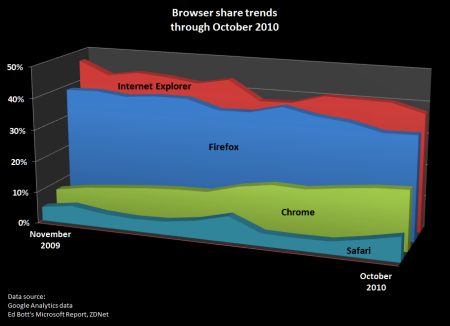Latest browser stats: Chrome, IE9 up, Firefox suffers enthusiasm gap

Thanks to blog analytics, I've been able to track trends in browser usage among my readers over time, both here and at my personal site. I was especially eager to see the stats for the month of October. That's the first full month that Microsoft's Internet Explorer 9 beta has been available to the general public. I saw plenty of enthusiasm when Microsoft unveiled the beta in mid-September, but has that enthusiasm been able to sustain itself? Can Microsoft stop the steady erosion in usage of Internet Explorer? And what does the future hold for Firefox, Chrome, and Safari?
I'm not particularly interested in picking winners and losers here; that's what racetracks are for. But knowing which browsers people are choosing to use and which ones are losing favor says a lot about what the web will look like in a few years. In a world where business is increasingly conducted online, using a variety of devices, those are important questions to ask.
I know that the audience at this site does not represent the Internet at large. By definition, the topics I cover attract a readership of IT professionals and tech-savvy enthusiasts. That means you, collectively, are early adopters, more likely to experiment with technology. But what I've seen consistently is that the public at large tends to follow the same trends as this group of early adopters, lagging in most cases by 9-18 months.
Now that this month is in the books, I've just checked the stats for this site. (Note: All stats in this post are from Ed Bott's Microsoft Report and not from zdnet.com at large; however, those stats are discussed in Larry Dignan's The Firefox vs. IE enthusiasm gap: What browser needs to rally the base more?) So what hints do this month's browser stats offer about the future of the web? I compared this month's stats with numbers going back for the past year, paying special attention to the latest versions of the leading browsers. Here are the month-by-month stats for this site for the past year.
Looking more carefully at the data, I come up with four conclusions:
Google Chrome is growing fast and shows no sign of slowing. In August 2008, Chrome didn't exist. In the past year, its share of usage at this site has grown by roughly 1% a month and currently stands at just over 19%. That is phenomenal. What's even more phenomenal is that more than half of those visitors were using unofficial beta and overnight releases. There is no question that Google's core constituency likes to live on the bleeding edge. And almost all of them are running Chrome on Windows.
Firefox users are abandoning it in droves. Overall, Firefox usage has dropped precipitously in the past two months. Back in 2007, it looked like a sure thing that Firefox usage would pass that of Internet Explorer within a matter of months. That didn't happen. Firefox usage crossed 40% briefly in August 2008, but it has been under that level ever since. The share of visitors to this site who used Firefox dropped in the past two months to roughly 33%, which is a return to levels I last saw in 2005 and 2006. It's a trend I first spotted back in March, and it hasn't slowed. The alarming statistic for anyone in Mozilla management is the complete lack of enthusiasm for Firefox 4. Only 1.06% of visitors to this site are using the Firefox 4 beta.
Internet Explorer 9 has sparked new interest. Usage of Internet Explorer among visitors to this site has dropped pretty steadily over the past two years. IE share dropped under 50% at this site in March 2009 and has been hovering around the 40% level most of the past six months. Back in mid-September, when Microsoft officially released its beta of Internet Explorer 9, I kept a close eye on what my readers were doing. In the three days after the release, more than 9% of the visitors to this site were using IE9. Much of that was just tire-kicking, of course. But after the initial glow wore off, a lot of those IE9 users stuck around. For the month of October, 3.96% of all visitors to this site were using IE9. That's more than IE6 (hallelujah!) and very close to IE7's usage. Despite the beta label and some compatibility issues, a large number of IE users were willing to stick with it.
Safari and Opera are destined to be niche players. Opera has not been able to gather any momentum, peaking at 2.5% earlier this year and dropping well under 2% for the past two months. Safari's usage has climbed steadily, thanks mostly to the iPad. In fact, if current trends hold, the share of traffic from iPads running Safari will surpass Opera in a matter of a month or two.
By my estimation, there's a huge enthusiasm gap among the top three browsers. The frenetic release schedule for Chrome appeals to its current crop of users, who are willing to blow right past the official release in search of the latest, fastest build. Firefox users, in stark contrast, are sticking with the current 3.6 release and ignoring Firefox 4. In a head-to-head matchup of IE9 and Firefox 4, Microsoft is ahead by a margin of more than 3:1.
We're not at the racetrack, so I won't be placing any bets. But if you ask me what I think browser stats will look like a year from today, I suspect that Microsoft and Google will be battling for the top two spots and Firefox will be in a desperate struggle to avoid being passed by Safari on a myriad of Apple devices.
If your prediction is different, leave it in the Talkback section.
